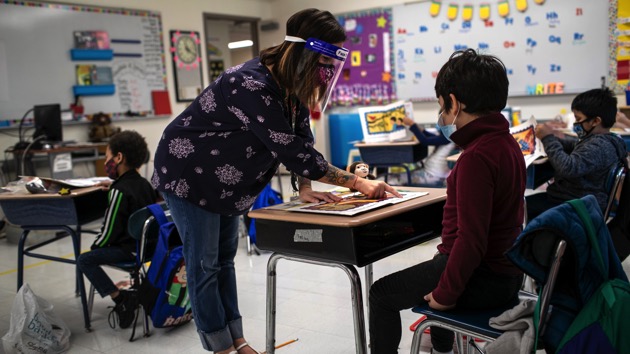COVID-19 live updates: Scale of education lost ‘nearly insurmountable,’ UNICEF warns
Written by ABC Audio All Rights Reserved on January 24, 2022

(NEW YORK) — As the COVID-19 pandemic has swept the globe, more than 5.5 million people have died from the disease worldwide, including over 866,000 Americans, according to real-time data compiled by Johns Hopkins University’s Center for Systems Science and Engineering.
About 63.4% of the population in the United States is fully vaccinated against COVID-19, according to data from the Centers for Disease Control and Prevention.
Here’s how the news is developing. All times Eastern:
Jan 24, 10:27 am
General in charge of US Special Operations Command has COVID
Gen. Richard Clarke, the head of U.S. Special Operations Command, has tested positive for COVID-19 and is working from home, U.S. Special Operations Command spokesperson Col. Curt Kellogg said.
Clarke, who has been vaccinated and boosted, has “very mild symptoms,” Kellogg said.
“Gen. Clarke has not been in the physical presence of senior DoD civilian leadership or members of the Joint Chiefs of Staff this month,” Kellogg said.
-ABC News’ Luis Martinez
Jan 24, 9:35 am
‘Conditions are ideal for more variants to emerge,’ WHO warns
The head of the World Health Organization warned Monday that although people across the globe must learn to live with COVID-19 “for the foreseeable future,” we cannot “give this virus a free ride.”
“There are different scenarios for how the pandemic could play out and how the acute phase could end,” Dr. Tedros Adhanom Ghebreyesus, WHO’s director-general, said in opening remarks at an executive board meeting in Geneva. “But it’s dangerous to assume that omicron will be the last variant or that we are in the endgame.”
“On the contrary, globally, the conditions are ideal for more variants to emerge,” he added.
Tedros listed a slew of both achievements and concerns in global health over the past year, including increasing access to medicines and health produces, the declining use of tobacco and the burden of anti-microbial resistance. But he said “ending the acute phase of the pandemic must remain our collective priority.”
Tedros insisted that “we can end COVID-19 as a global health emergency, and we can do it this year,” though he admitted “we have a long way to go.” He said it requires meeting the WHO’s target to vaccinate 70% of the population of each country against COVID-19 by the middle of this year, with a focus on people who are most at-risk, as well as boosting testing and sequencing rates to track the virus and its emerging variants more closely.
“We can only do this with engaged and empowered communities, sustained financing, a focus on equity, and research and innovation,” he said. “Let me put it plainly: If the current funding model continues, WHO is being set up to fail. The paradigm shift in world health that is needed now must be matched by a paradigm shift in funding the world’s health organization.”
Jan 24, 7:45 am
Scale of education lost ‘nearly insurmountable,’ UNICEF warns
More than 635 million students around the world remain affected by full or partial school closures due to the coronavirus pandemic, according to the United Nations International Children’s Emergency Fund (UNICEF), which described the scale of education lost as “nearly insurmountable.”
“In March, we will mark two years of COVID-19-related disruptions to global education. Quite simply, we are looking at a nearly insurmountable scale of loss to children’s schooling,” Robert Jenkins, UNICEF chief of education, said in a statement Monday. “While the disruptions to learning must end, just reopening schools is not enough. Students need intensive support to recover lost education. Schools must also go beyond places of learning to rebuild children’s mental and physical health, social development and nutrition.”
As Monday marks the International Day of Education, UNICEF warned that many schoolchildren, especially the younger and more marginalized, have lost basic numeracy and literacy skills since the start of the pandemic in March 2020. In low- and middle-income countries, learning losses to school closures have left up to 70% of 10-year-olds unable to read or understand a simple text, up from 53% prior to the pandemic, according to UNICEF.
In Ethiopia, primary school children are estimated to have learned between 30% to 40% of the math they would have acquired if it had been a normal school year, UNICEF said.
In South Africa, schoolchildren are between 75% and a full school year behind where they should be. Some 400,000 to 500,000 students reportedly dropped out of school altogether between March 2020 and July 2021, according to UNICEF.
Across Brazil, one in 10 students aged 10 to 15 reported they are not planning to return to classrooms once schools reopen. In several Brazilian states, around three in four children in second grade are off-track in reading, up from one in two children prior to the pandemic, UNICEF said.
Meanwhile, learning losses have also been observed across the United States. In Texas, for example, two-thirds of children in third grade tested below their grade level in math in 2021, compared to half of children in 2019, according to UNICEF.
Copyright © 2022, ABC Audio. All rights reserved.





